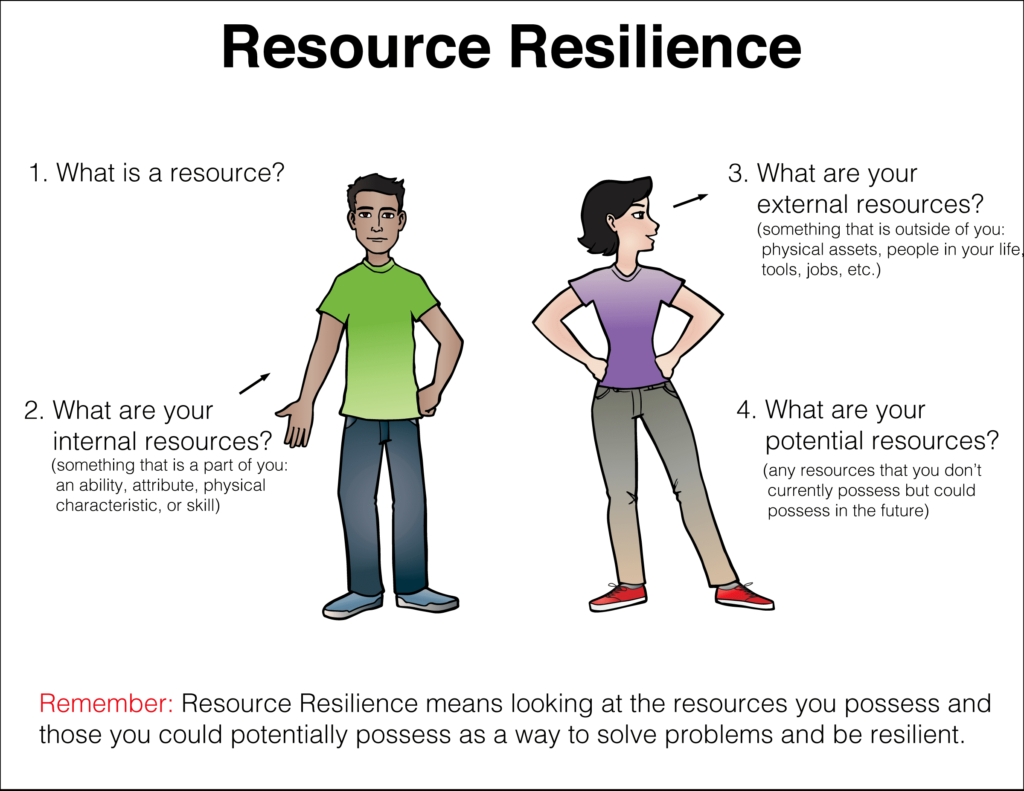Resource Resilience
What is Resource Resilience?
Resource Resilience: Your resilience can be increased by tapping into the resources you currently possess or could potentially possess. You maximize your talents, mindset, abilities, relationships, money, physical assets, and personality traits. You also realize that you have undeveloped talents and untapped capabilities that you can use or develop. And as you proactively acquire and build upon your resources, you become increasingly resilient.

Listen to this Chapter
What are Your Resources?
Take a moment to think about – even write down – the resources you possess in life that help you with your parenting. Having trouble? Let’s break it down:
If you’re a working parent, what skills do you possess that help you thrive in a career that supports your family?
What skills at home contribute to your success as a parent? Your ability to cook, do laundry, unclog a toilet, or change a diaper are all resources.
How has money and a budget benefited your family?
What services do you have access to that help you or your children? Think about medical care, the education system, after-school groups, public parks, school lunch programs, counseling services, the local library, public transportation, community sports, church groups, etc.
Have you ever used Google to solve a parenting problem?

If you lack resources, realize that this lack can actually be a thing that makes you MORE resilient. It will make you hyper-attuned to the resources you do have and use them to their maximum capacity. It will stretch you to find resources and services that you didn’t know existed before.
What are some physical possessions that make life easier for you and your children? This list can be quite long as you think both small and big – a family pet, your handy pancake spatula, phone, Internet access, air conditioning, a favorite stuffed bear, the family car, Netflix, bunk beds, baseball mitts…
Finally, who are the people in your life and your children’s lives who make your job easier? Your parents, neighbors, or close friends might immediately come to mind, but if not, there is still a vast network of people who have your child’s best interest at heart. Think about the school principal, school counselor, teacher, and bus driver, doctor, daycare worker, softball coach, or the nice lady at the grocery store checkout who gave your screaming toddler a sticker.
Your list by now should be fairly long. Take a good look at it – maybe you never thought about all the resources at your fingertips that have the potential to make you a better and more resilient parent. Do you feel you’re using all of these resources to their maximum capacity? If you wrote your list down, circle a few that you feel you could focus on a little more.
Potential Resources
This brings us to the final point of Resource Resilience – the recognition that there are potential resources out there that maybe you haven’t even thought of yet. Let’s say you’re in a bind with finding a job.
- What skills could you acquire that would make you more qualified for the work you’d like to do?
- Who could you get in touch with to help you made the connection you need?
- Is there volunteer work you could do to get a little more experience under your belt?

These are the kind of questions that someone with Resource Resilience asks regularly, continually expanding their resource pool, as they actively seek out more doors to open.
The Country of Taiwan and Your Resilience
If you feel like your resource list is shorter than most, consider the example in The Resilience Breakthrough of the country of Taiwan, a resource-deficient nation that is successful because it sees people – their talents, energy, and skillsets – as its richest resource. If you lack resources, realize that this lack can actually be the thing that makes you MORE resilient. It will make you hyper-attuned to the resources you do have and use them to their maximum capacity. It will stretch you to find resources and services that you didn’t know existed before. With a shorter list, you and your children will dig deeper, work harder, and become stronger as you work to acquire the resources you need. This is Resource Resilience.

Discussing Resource Resilience with Your Child
Talk to your children about some of the things they are grateful for. Explain that these things are all resources. Discuss the ways these things can help your children be more resilient in life.
Ask your children about a craft or hobby they’d like to get good at, then talk about how they might connect with people or resources that could help them develop this new talent.

Reflection
Think about an area where you’re struggling right now as a parent or spouse. What are some resources you currently possess that could help you with this challenge? What are some resources you could acquire that might help you address this challenge?

“I used to look at people I thought had it all and think they had it made… I can look back and see that because I had to work really hard, because I had to really dig deep to access strengths that have gotten me through, I’ve become much stronger. I’ve developed abilities that I never would have if my life had been easy.“